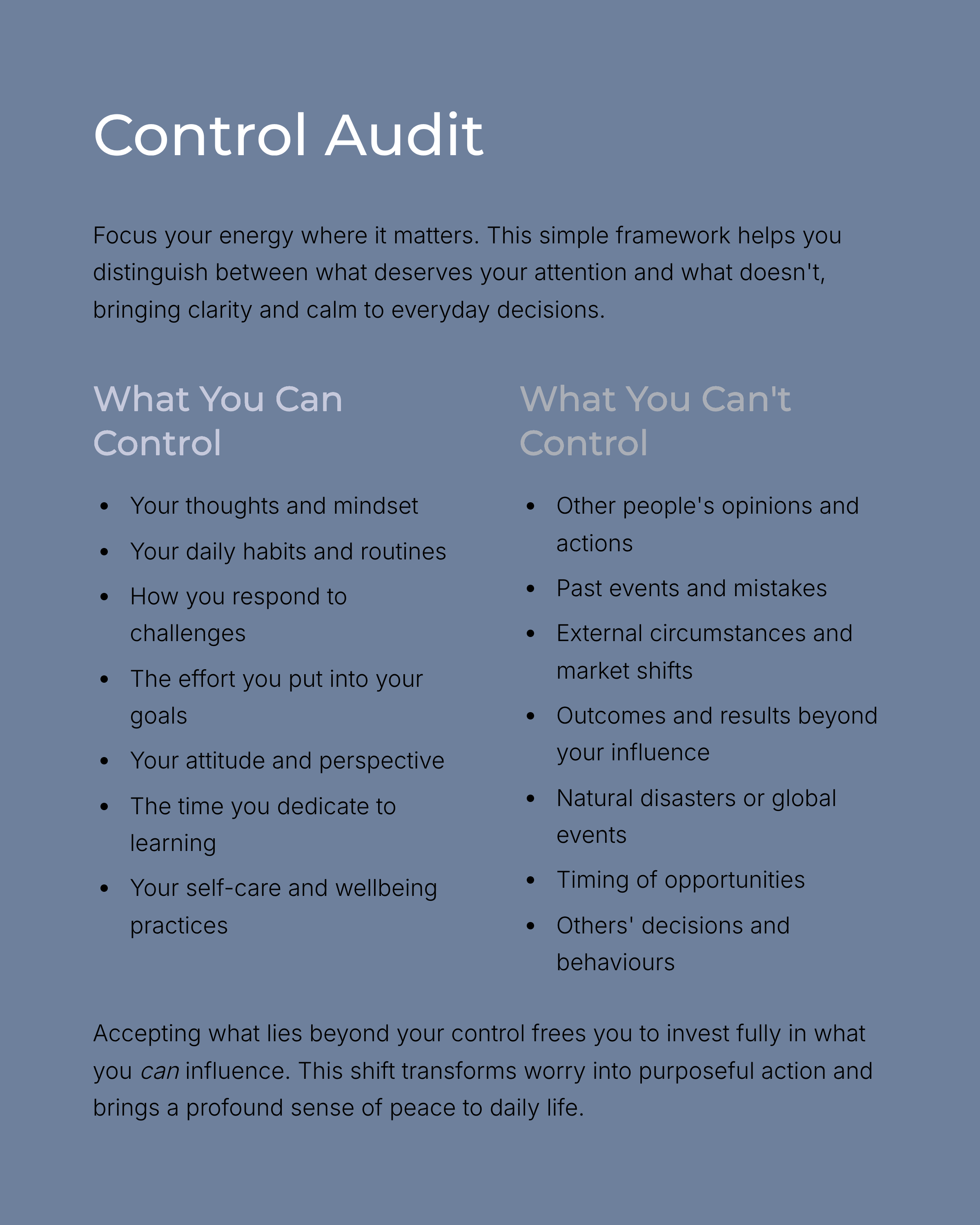Read time: 6 minutes
Quick Summary:
Feeling stuck or scared to make a change? These five simple Stoic-inspired steps help you overcome fear of change without waiting for the “right time” or perfect conditions.

It’s normal to hesitate before change.
Your brain is wired to prefer the familiar even if the familiar isn’t working. But fear isn’t a stop sign; it’s a signal to slow down and look closer.
Modern neuroscience shows that repeated, safe exposure to what scares us helps reduce fear over time.
Here’s how to turn that fear into curiosity, one small step at a time.
1. Name What You’re Really Afraid Of
“Change” feels vague because it hides what actually scares you.
Write down the exact fear:
“I’m afraid I’ll fail.”
“I’m worried people will judge me.”
“I don’t want to lose what I already have.”
Once you name it, the fear shrinks. Words make the invisible visible and visible things can be worked with.
2. Do a Quick “Control Audit”
Grab a notebook and draw two columns:
Left: what you can control (your effort, focus, attitude)
Right: what you can’t (the weather, others’ opinions, outcomes)
Now circle one thing from the left column and act on that.
The Stoics built their calm around this simple truth: peace starts when you stop trying to control what isn’t yours to carry.
If you want to deepen this practice, see how the Stoic habit loop creates lasting reflection and action. (The Stoic Reflection Habit Loop)
3. Take One Micro-Action – Just for Curiosity’s Sake
Don’t aim for transformation. Aim for a two-minute experiment.
Try one small thing you’ve been avoiding.
- Send the email.
- Research the course.
- Go for the walk.
You’re not committing forever you’re gathering data. Curiosity beats pressure every time.
4. Observe, Don’t Judge
After your micro-action, pause and note what actually happened.
What surprised you? What felt easier than expected?
This isn’t a test it’s research on yourself.
Your inner critic will want to score your effort. Politely decline. You’re not failing; you’re learning.
5. Repeat Until Fear Turns Familiar
Repetition is what rewires fear. The more often you face a small discomfort, the less power it holds.
By week two, curiosity starts to replace resistance. That’s not luck — it’s neuroscience at work.
In fact, studies of “fear extinction” show that repeated safe exposure decreases fear-responses over time.

Why This Works
These steps blend ancient philosophy with modern psychology and neuroscience:
- Stoic wisdom: Focus only on what’s within your control.
- Cognitive science: Small, repeated exposure reshapes fear responses.
- Mindful awareness: Observing without judgement builds emotional distance from fear.
Together, they help you trade anxiety for agency- one micro-action at a time.
Quick Recap
1. Name Your Fear | 2. Control Audit | 3. Micro-Action | 4. Observe | 5. Repeat
3 Actions You Can Take Today
- Write down one fear you’ve been avoiding naming.
- Circle one thing you can control about it.
- Do one two-minute action today to explore it not fix it.
Everyday Mastery Steps You Can Take Now
- Start messy. Perfection isn’t the goal — presence is.
- Note what changes. Fear often shifts the moment you take any action.
- Reflect weekly. Ask yourself: “What felt slightly easier this time?”
If you’d like to dive deeper, check out the full guide to overcoming fear of change here: How to Overcome Fear of Change.
Also, explore how the Stoic habit loop supports reflection and resilience: The Stoic Reflection Habit Loop and how to handle the modern “tech + overwhelm” challenge: Stoicism and Technology / AI Overwhelm.
If fear or anxiety feels hard to manage, Mind UK offers free guidance and resources for practical support.
Disclaimer: I’m a coach, not a clinician. What I share comes from real practice and personal growth, not therapy. If you’re finding things hard, it’s okay to get professional support — it makes a difference.
This is your permission slip to start messy.
We don’t chase perfect here we practise progress, because that’s Everyday Mastery.
Everyday Mastery blends science, mindfulness, and small daily actions to help you build habits that last.
If you enjoy these posts and want to support the writing, you can buy me a coffee — it keeps the kettle (and the ideas) warm.
Kel is the writer behind Everyday Mastery, where she shares the real, messy, and meaningful process of building habits, resilience, and self-belief from the ground up. Her writing blends ancient philosophy with modern science, always focused on small, practical steps that lead to lasting





